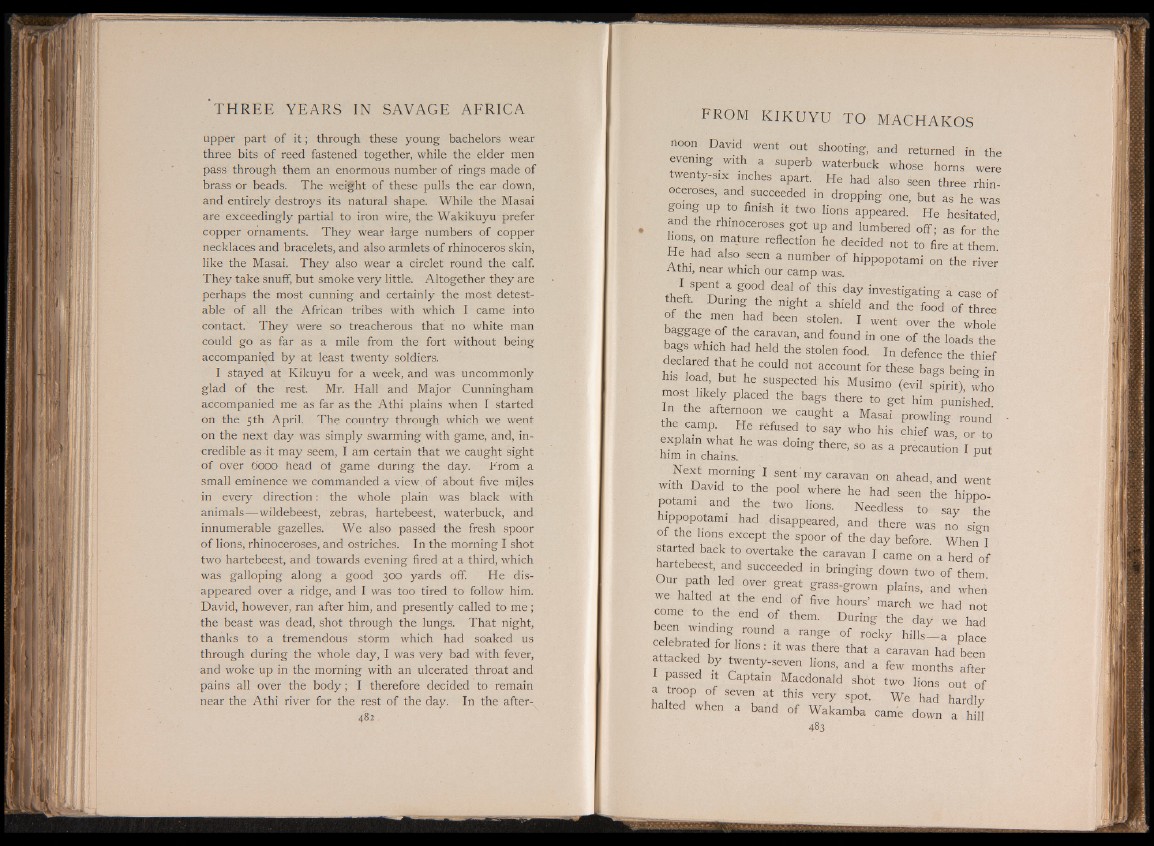
upper part of i t ; through these young bachelors wear
three bits of reed fastened together, while the elder men
pass through them an enormous number of rings made of
brass or beads. The weight of these pulls the ear down,
and entirely destroys its natural shape. While the Masai
are exceedingly partial to iron wire, the Wakikuyu prefer
copper ornaments. They wear large numbers of copper
necklaces and bracelets, and also armlets of rhinoceros skin,
like the Masai. They also wear a circlet round the calf.
They take snuff, but smoke very little. Altogether they are
perhaps the most cunning and certainly the most detestable
of all the African tribes with which I came into
contact. They were so treacherous that no white man
could go as far as a mile from the fort without being
accompanied by at least twenty soldiers.
I stayed at Kikuyu for a week, and was uncommonly
glad of the rest. Mr. Hall and Major Cunningham
accompanied me as far as the Athi plains when I started
on the 5 th April. The country through which we went
on the next day was simply swarming with game, and, incredible
as it may seem, I am certain that we caught sight
of over 6000 head of game during the day. From a
small eminence we commanded a view, of about five miles
in every direction: the whole plain was black with
animals—-wildebeest, zebras, hartebeest, waterbuck, and
innumerable gazelles. We also passed the fresh spoor
of lions, rhinoceroses, and ostriches. In the morning I shot
two hartebeest, and towards evening fired at a third, which
was galloping along a good 300 yards off. He disappeared
over a ridge, and I was too tired to follow him.
David, however, ran after him, and presently called to me;
the beast was dead, shot through the lungs. That night,
thanks to a tremendous storm which had soaked us
through during the whole day, I was very bad with fever,
and woke up in the morning with an ulcerated throat and
pains all over the body; I therefore decided to remain
near the Athi river for the rest of the day. In the afternoon
David went out shooting, and returned in the
evening with a superb waterbuck whose horns were
twenty-six inches apart. He had also seen three rhinoceroses,
and succeeded in dropping one, but as he was
going up to finish it two lions appeared. He hesitated
and the rhinoceroses got up and lumbered off; as for the
lions on mature reflection he decided not to fire at them
He had also seen a number of hippopotami on the river
Attn, near which our camp was.
i B i 1 g° ° d deal° f this day investigating a case of
theft During the night a shield and the food of three
o the men had been stolen. I went over the whole
baggage of the caravan, and found in one of the loads the
ags which had held the stolen food. In defence the thief
declared that he could not account for these bags being in
his load, but he suspected his Musimo (evil spirit), who
mostJikely placed the bags there to get him punished.
the camo H °n ■ the camp He refuse Bd tPo *sa y *w hMo " Shaisi cPhr°iewf liwna^s , roor™ tdo
U m ^ d°ing 'here' S° “ a I P“t
Next morning I sent my caravan on ahead, and went
with David to the pool where he had seen the hippopotami
and the two lions. Needless to say the
hippopotami had disappeared, and there was no sign
of the lions except the spoor of the day before. When I
started back to overtake the caravan I came on a herd of
rtebeest, and succeeded in bringing down two of them
Our path led over great grass-grown plains, and when
we halted at the end of five hours’ march we had not
come to the end of them. During the day we had
been winding round a range of rocky h ills - a place
ce ebrated for lions: it was there that a caravan had been
attacked by twenty-seven lions, and a few months after
I passed it Captain Macdonald shot two lions out of
a troop of seven at this very spot. We had hardly
halted when a band of Wakamba came down a hiU